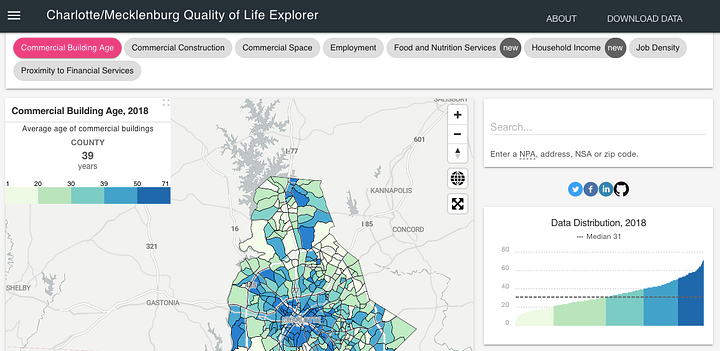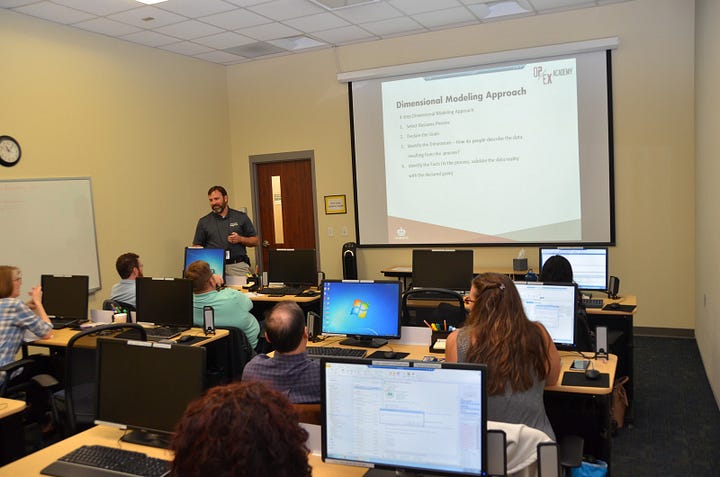Charlotte, North Carolina, USA
Data-Rich Training and Development in Charlotte.
Project Type:
Community Engagement, Communications, Equity, Finance, High-Performing Government, Housing

2024 Gold Certification
Charlotte, North Carolina, used data to identify neighborhoods where residents are struggling to keep up with rising housing costs. This Displacement Risk Analysis builds on the City’s efforts to create a citywide standard of excellence in the collection, dissemination and use of disaggregated data in decision-making. This work forms the basis of Charlotte’s interventions to keep people in stable housing and a framework for equitable growth within the City’s 2040 Comprehensive Plan.
2020 Silver Certification
Created an interactive tool to provide residents with data around key indicators about where they live and work within the community – including housing, education, environment, health, and safety.
Introduced and maintained a variety of data-driven dashboards which offer user-friendly options for residents, city staff, and leaders to access vital information.
Launched a citywide collaboration offering trainings on how to use data collaboratively, helping staff make better-informed decisions when creating or updating city programs and policies.
Charlotte’s Long History with Data
Spend a day at the Government Center in Charlotte, NC, and three things become apparent: The staff has a deep affection for the city — its friendliness and welcoming vibe. They can’t get enough of the hush puppies at Midwood Smokehouse. And they are extraordinarily enthusiastic about tapping the power of data in city government to improve lives.
There is a distinctive joy that comes across when teams work together to support city-wide goals. Staff share their data super powers, and operate under the mantra “Making Heroes out of Others” — whether supporting Charlotte’s transportation team with the Vision Zero initiative, making information easier to find with the online Public Records Requests Tracker, or most recently, empowering Emergency Management as they respond to the COVID-19 crisis.
Maybe it has to do with Charlotte’s long history of using data to achieve strategic goals and build resources the public can directly interact with. Case in point: Way back in 2000, the City launched what is now the Quality of Life Explorer, an online dashboard that details an incredible array of social, housing, economic, environmental and safety conditions in Charlotte and surrounding Mecklenburg County. A study that began with nine indicators and just a handful of neighborhoods 20 years ago is now a robust, interactive online tool that incorporates over 80 variables and more than 460 neighborhood areas.

Fittingly, Charlotte itself has also grown significantly during the last two decades, in no small part due to its high quality of life. With a job growth rate far beyond the national average across the last decade, its population rose by nearly 25 percent since 2010 — faster than most cities in the country.
All that growth created opportunities and challenges. With more and more residents relying on city services and infrastructure, and development project proposals multiplying, the Charlotte City Council started voicing its need for detailed data on which to base decisions.
City leaders got the message: It was time to ramp up data know-how to help ensure rapid growth didn’t hurt the quality of life that attracted so many to Charlotte in the first place.
An In-House Academy
City leaders could have sent teams off to trainings with outside vendors to strengthen data reporting and analytics capabilities across all departments. But why use theoretical data sets in an external curriculum when staff could learn while troubleshooting real-world challenges with colleagues? To that end, the City’s data team decided to create their own solution — one that fills skill gaps by taking advantage of in-house expertise, builds relationships across departments, and fosters a culture of curiosity and innovation. It’s called OpEx Academy, and it underscores how passionate city staff is about data and putting it to work for the community.
Housed within the Center for Data and Analytics (CDA), the Academy has offered a total of 65 (free) courses to staff since launching in 2018. CDA initially focused on courses that addressed capacity needs; topics included data quality assurance and performance management tools. Within a year, courses had long waiting lists. As interest grew, CDA developed courses responding to specific staff interests. (Fall 2019 offerings included “SQL Junction — What’s Your Function?” and “Intro to City Shared Data Applications.”)
So far the OpEx Academy has more than 20 city staff trainers across departments as diverse as Charlotte Water, Human Resources, Charlotte Department of Transportation, and Innovation & Technology. “OpEx Academy is a great citywide collaboration,” says Rebecca Hefner, the City’s Data & Analytics Officer who is also a peer trainer and leads many of the city’s data-informed efforts.
“Using city staff to develop and deliver training builds a network of sharing and collaboration that extends beyond the training class, and using real city data with real city challenges makes the learning immediately applicable. Reaching out to one another for help, and sharing data to solve problems is now part of our culture.”

More than 230 employees have received over 1,400 hours of free training and instruction designed and taught by peers. One collaborative course at a time, the City of Charlotte is deepening its capacity for data-driven governance and building a culture in which data powers solutions.
A New Approach to Housing
Charlotte’s approach also resulted in a creative solution for affordable housing. As Charlotte grew rapidly during the last decade, gentrification pushed long-time lower income residents out of historically affordable neighborhoods. By 2016, the City had a shortage of over 30,000 affordable housing units.
The city’s Housing Locational Policy (HLP) was created years earlier to serve as a guiding framework for building subsidized multifamily developments for lower-income households. As the housing shortage grew and opposition from neighbors with regard to many proposed projects remained intense, the City Council increasingly approved developments out of alignment with HLP values and goals — members just wanted to build new housing units quickly. Over time, Council members realized they were unwittingly reinforcing geographical socioeconomic stratification.
The status quo wasn’t working — so the City convened seven civic engagement sessions to solicit input from residents on better affordable housing approaches.
The way forward soon emerged. The City revised the HLP to more clearly offer guidance for preserving and creating affordable housing, while also supporting the City’s revitalization efforts and promoting diverse neighborhoods. But city leaders knew they needed more than just the right housing goals — it needed a data-driven tool to help City Council achieve those goals. As the National League of Cities has noted, data emerged as the linchpin allowing Charlotte to allocate affordable housing resources in a timely and equitable fashion.
Since launching in 2019, the Housing Locational Scoring Tool has helped City Council members compare and contrast the value and viability of proposed projects. Housing developers are required to submit applications with a scored proposal which incorporates four criteria: proximity [to transit assets and amenities], income diversity, access to jobs, and neighborhood change. The tool which generates the score, updated twice per year with the latest data, can be used and shared to help residents understand how and why City Council make decisions on housing projects, which are sometimes controversial.
The Housing Locational Scoring Tool allows city leaders to make better decisions and allows developers to select sites that better align with city goals. “The tool has changed the nature of the housing conversation,” says Housing Operations Manager Warren Wooten.
“When developers are looking at sites, they are really focused on coming to us with sites that provide the best possible score — and that means sites that best meet council’s housing objectives around accessibility, equity, diversity and preserving great neighborhoods.”
“And the conversations with developers, council and the public are no longer subjective; it’s conversations about the data that are in our tool, and what it means, and how it advances our housing goals.” says Wooten.
Keeping Close Tabs on Capital Projects
Housing wasn’t the only area the City Council called on the data and analytics team for help. After the budget suddenly doubled on a capital project in early 2019, the council realized it needed to be able to closely track the progress of projects across the city. City Manager Marcus D. Jones shared some unpleasant news: Many capital projects already in motion had been approved years earlier based on inaccurate budget estimates. Key work to establish reliable cost estimates, such as scoping, pre-planning, and design, had often happened after the council had approved projects.
Things needed to change as quickly as possible to prevent big budget risks. Part of the way forward was clear enough: The City Council would insist on more detailed planning documents and projections when considering any proposed capital projects, and the budget and finance teams would revamp their processes accordingly. But Council members also wanted a real-time window on projects underway to keep tabs on them — a window the public could ideally see as well, in the interests of transparency and accountability.
The council turned to CDA to create a big-picture solution that would bring together an array of different data sets on capital projects across all departments in one easy-to-navigate place. Tons of data existed, but it was available through various departments, and had to be manually collected, integrated and mapped each time there was a request for information. CDA’s data team got to work — the first step was to create a comprehensive dataset on the City’s capital projects.
In late 2019, with strong backing from the City Manager, CDA launched the city’s Capital Project Dashboard. Hannah Bromberger, Senior Strategy & Budget Analyst, shared, “The Capital Project Dashboard has centralized visualization for all city capital projects. The public can now explore information, including cost and completion dates in an easy to navigate dashboard. Internally, the entire organization now has a central repository of data and consistent language for tracking projects, making for seamless communication and reports to leadership and residents.”
Now no one — whether city officials or members of the public — is in the dark about active projects located across the entire city. A companion reporting tool was later added to make it easy for residents, staff, and Council members to quickly generate customized printable reports on the whole capital program or individual projects. Data is updated at least quarterly.
Today, with clear sight lines into both proposed and approved capital projects, the City Council is able to make decisions more effectively and wisely — and track project performance closely. These dashboards, helping city officials make more informed decisions, are engendering trust between city officials and the people they serve as residents can now more easily understand what’s happening, and where, when, and why.
“We are proud of our staff who diligently engage with and advance our city’s data practices in order to help our elected officials make more informed decisions for our communities, offering our residents the chance to engage with the city in a frank and honest way, through data,” said Charlotte Mayor Vi Lyles.
“With good people, good data, and good processes, anything is doable, any challenge surmountable.”